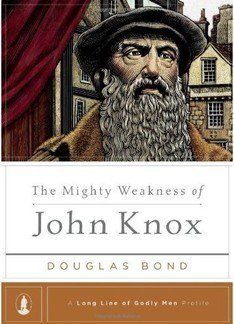I have to confess to two failings. Firstly that, despite serving in a Bible College in Edinburgh I have never read a biography of John Knox, and secondly that I have been influenced, though never completely persuaded, by the ‘bad press’ Knox has had. Douglas Bond’s book is the latest in the excellent series A Long Line of Godly Men and is a great introduction to someone who is, I suspect, one of the most maligned and misunderstood figures of the Reformation.
Bond’s underlying premise, reflected in his title, is that Knox was, by disposition, genuinely frail, weak and fearful and yet was used by God to accomplish great things, striking fear into the hearts of many of those who stood against him. Bond presents his subject as ‘a model for the ordinary Christian, especially the one who feels his own weakness but who nevertheless wants to serve Christ in a troubled world.’ He quotes the words of Thomas Smeaton who said of Knox, ‘I know not if God ever placed a more godly and great spirit in a body so little and frail.’
Following an opening chapter in which Bond gives an overview of Knox’s life and legacy, introducing him in such a way that you really want to read on, Bond highlights various aspects of John Knox’s life and ministry, making frequent and appropriate comparisons to Elijah, and helps bring out, from under the myths and caricatures, the real man and the secret of his effectiveness. Key to all of it was his ‘uncompromising Christology’, for, says Bond, ‘When a man’s supreme concern is that the life of Jesus be manifested in his life, there’s no time for navel-contemplative nonsense.’
He looks at Knox as ‘an eminent wrestler with God in prayer’, a discipline perhaps learned from his association and fellowship with Calvin in Geneva. He considers his power and influence as a preacher who, despite almost constant physical ailments preached several times a week from his pulpit in St Giles, Edinburgh and for up to three hours at a time. Bond quotes a Scottish lord who wrote of Knox’s preaching, ‘I assure you the voice of one man is able in one hour to put more life in us than five hundred trumpets continually blustering in our ears’ and describes how the preacher would both ‘rail against tyrants – political or ecclesiastical…and he would tenderly call lost sinners to repentance and faith.’
Only perhaps two of Knox’s sermons survive, partly due to his practice of preaching extemporaneously, but his writings testify to his eloquence and theology. He co-authored the Scots Confession, ‘a foundation for theology, worship, literacy and preaching in Reformation Scotland’; a copy of which is helpfully included in an appendix. An unshakeable and unashamed Calvinist, ‘in all of Knox’s writings,’ testifies Bond, ‘there was no single subject on which he wrote more than the doctrine of predestination’ but he ‘never wielded predestination as a club; he tenderly uncoiled it as a lifeline for the floundering lost.’
Knox’s influence in his empowering of the weak and disadvantaged has been largely overlooked or forgotten. Douglas Bond movingly relates Knox’s ministry to women and his concern for them – far removed from the mysoginsitic reputation he has undeservedly earned, his encouragement of fellow pastors and the laity and his contribution to education in general in that he established the first national education system in the western world.
I found especially helpful Bond’s setting in context the much misunderstood ‘monstrous regiment of women’ explaining that ‘monstrous’ meant ‘unnatural’ and the assertion was made at a time when several notably cruel and violent women ruled in European countries and many believers, Knox’s friends among them, had perished at their hands.
Douglas Bond is an able and engaging writer and it is hoped this book will not be his last. He is given to some apposite turns of phrase couched in contemporary terms, such as when he says that, “Mary Guise, fatally ill, did her best to stop him, but the effect was like that of a hummingbird on a jumbo jet.”
For me, the test of a good biography is whether or not I want to dig deeper and read more on the subject. In those terms, this book passes with flying colours. Knox appears to have learned to fear God and disregard men to an amazing capacity, and his zeal for the honour of God and his word emboldened him against dangerous enemies. Do not the days we live in now call for preachers equally consumed with the glory of God and equally fearless of all human powers and institutions?
John Brand,
Edinburgh




